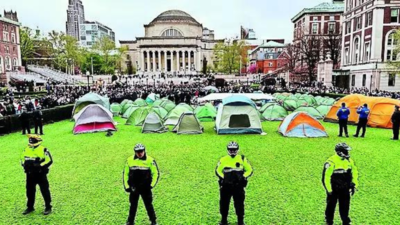
In a 1965 interview, the Rev. Martin Luther King Jr. defended the principle of civil disobedience, insisting that it should be exercised “civilly” and in accordance with the rule of law. Chaos has tainted the pro-Palestinian movement, which has galvanized American campuses for the last two weeks and was more or less inevitable given the violent and divided social context that prevails in the United States. Troublemakers are never far away, nor are politicians who are ready to politicize them, nor media outlets quick to blow their actions out of proportion. Nevertheless, it is fair to say that, on the whole, students have peacefully expressed their justified disapproval of Israel’s war with genocidal overtones in Gaza and the unwavering support the U.S. is providing for it.
In its crusade against “wokeism,” Republicans have made a big deal of this tension and are working, like Israeli Prime Minister Benjamin Netanyahu, to delegitimize the movement on the pretext that it is, above all, antisemitic — which is indescribably hypocritical considering all of the xenophobic undertones the Republican Party, under the influence of Trumpists, allows to circulate among its ranks. Confusion and polarization are advancing armed.
There have been, unfortunately, some intolerable antisemitic excesses, but spokespersons for the umbrella organization Students for Justice in Palestine swear these excesses do not represent the movement as a whole. A good thing. As evidence, they point to the fact that Jewish organizations like Jewish Voice for Peace and IfNotNow are taking part in the protests. It is worth noting, however, that they claim to be affiliated with the Palestinian-led campaign BDS, or Boycott, Divestment, and Sanctions, which was founded in 2005 and based on the model of the South African fight against apartheid. And, while denying any antisemitism, it nevertheless claims to be anti-Zionist. This certainly raises questions that the constellation of pro-Palestinian organizations cannot skirt—questions that call for reflection and clarification.
However, none of that should detract from the importance of the cause. This wave of protests, encampments, and sit-ins arises from the unconditional American military support that Israel benefits from to obliterate Gaza in the aftermath of the Oct. 7 attacks carried out by Hamas. More specifically, pro-Palestinian groups are proving very useful in denouncing the somewhat transparent ties between the heads of universities and big donors like weapons manufacturer Lockheed Martin—ties that Columbia University President Nemat Shafik sought to ignore by calling in the New York Police Department to hastily dismantle pro-Palestinian encampments on April 18. By compromising intellectual freedom and freedom of speech in this way—something she has been strongly condemned for—she has only made the situation worse. In contrast, Brown University in Rhode Island showed wisdom and openness on Tuesday when it agreed to conduct discussions with student leaders on the divestment of funds from companies implicated in the Israeli military campaign. This is the constructive example to follow.
The Democrats’ election success depends on young voters. The party can hardly afford to lose any young voters along the way. Consequently, President Joe Biden finds himself caught between electoral and geostrategic interests. Scrambling to arrive at a new truce in Gaza, Secretary of State Antony Blinken is attempting to free the U.S. from this trap. But if the issue is political and electoral, it is also—as the nation’s campuses are making loud and clear—moral, a dimension American foreign policy distinctly lacks.

Leave a Reply
You must be logged in to post a comment.